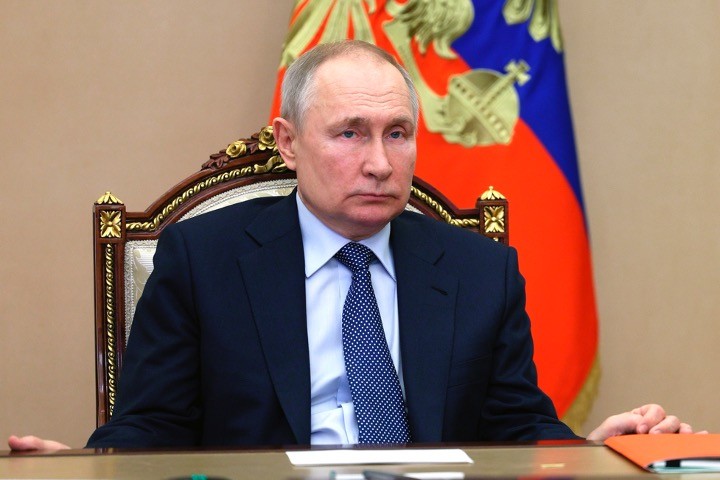
AP ImagesVladimir Putin
Russia’s New Foreign Policy Doctrine Emphasizes “Hybrid War” With West
By Luis Miguel
Like China, Russia understands that the world’s greatest superpowers are already at war — and the theater of the war extends far beyond the traditional battlefield.
In line with Moscow’s ongoing struggles with the United States, Russian President Vladimir Putin on Friday signed off on a new version of his country’s foreign policy doctrine — a document detailing the priorities and goals of Russian diplomacy.
The new concept places emphasis on claims that the West is trying to undermine Russia on various fronts due to the war in Ukraine.
As reported by Russia Today (RT), Putin’s approval of the document was announced Friday during a meeting with top officials from the Russian Security Council. Among those present were Prime Minister Mikhail Mishustin, Defense Minister Sergey Shoigu, and Foreign Minister Sergey Lavrov.
According to the Russian foreign policy doctrine, “The United States and their satellites have used measures, taken by the Russian Federation to protect its vital interests regarding Ukraine, as a pretext to escalate their long-standing anti-Russian policies, and have unleashed a hybrid war of a new type.”
This is despite the fact that, according to Moscow, Russia “does not see itself as the West’s enemy, does not isolate itself from it and harbors no hostile intentions towards it.” Per the document, Russia’s hope is that the Western nations will “recognize the futility of confrontational policies and hegemonic ambitions” and form a mutually beneficial relationship with Moscow.
“The Russian Federation is ready for dialogue and cooperation on such a basis,” the document states.
Furthermore, the concept asserts that the U.S. and its allies want to “weaken Russia in every possible way,” and the “hybrid war” encompasses military, technological, and economic facets intended to “limit its sovereignty in external and internal politics and to erode its territorial integrity.”
This concept represents a marked shift from the previous iteration of Russia’s foreign policy doctrine, signed in 2016. That version focused on combating terrorism and growing Russia’s global footprint.
Russia is continuing to leverage its influence in Eastern Europe. As the Associated Press reports, Belarusian President Alexander Lukashenko said Friday that Russia might place nuclear weapons in his country. This comes after Putin announced plans last week to deploy short-range and small-yield nuclear weapons in Belarus.
“Putin and I will decide and introduce here, if necessary, strategic weapons, and they must understand this, the scoundrels abroad, who today are trying to blow us up from inside and outside,” Lukashenko said during his annual address. “We will protect our sovereignty and independence by any means necessary, including through the nuclear arsenal.”
Lukashenko added that while Russia would have control over the tactical nuclear weapons, the Belarusian leader would also have a say in their use. “Don’t say we will just be looking after them, and these are not our weapons,” he asserted. “These are our weapons and they will contribute to ensuring sovereignty and independence.”
AP further reported:
Putin has said that construction of storage facilities for tactical nuclear weapons in Belarus will be completed by July 1 and added that Russia has helped modernize Belarusian warplanes to make them capable of carrying nuclear weapons.
While the deployment of Russian short-range tactical nuclear weapons to Belarus would put them closer to potential targets in Ukraine and NATO members in Eastern and Central Europe, it wouldn’t make much sense for the Kremlin to station any of its strategic nuclear-tipped missiles on Belarusian territory. Those missiles have intercontinental range and can reach a target anywhere around the world from their positions in Russia.
Ukrainian President Volodymyr Zelensky on Friday blasted Russian plans to deploy nukes to Belarus, criticizing Lukashenko for allegedly ceding control of his country to Moscow.
Since the start of the Ukraine War, Russia and Belarus have grown their military cooperation. While no Belarusian troops have been sent to Ukraine, Russian troops have been stationed in Belarus, and Moscow used Belarus as a staging ground for launching their invasion last year.
Another national leader friendly to Putin, Hungarian Prime Minister Viktor Orban, said on Friday that the European Union is underestimating Russia’s economic capacity.
Per RT, Orban called it a “fatal mistake” to underestimate Russia’s “huge” capacity, demonstrated in the country’s ability to adjust its economy to Western sanctions.
“I remember well that in 2015 we exported a lot of food products to Russia.… In three years, Russia has built its agriculture and food industry to such an extent that if Hungary wanted to export food there today, it would either not work or be much more difficult than before the imposition of sanctions,” Orban told Kossuth Radio.
The Hungarian prime minister argued that the West’s punitive measures against Moscow “were supposed to hit Russia, but hit Europe.” He said the sanctions had a devastating impact on Hungary, causing prices — in particular energy prices — to drastically rise throughout the country.
Orban pointed out that although the Western powers are trying “to convince everyone of the imminent collapse of the Russian economy,” Russia’s foreign trade grew by eight percent last year and its inflation was lower than the EU’s.
Luis Miguel
Luis Miguel is a writer, speaker and activist dedicated to exposing and combating the forces of tyranny.
Published with permission of thenewamerican.com